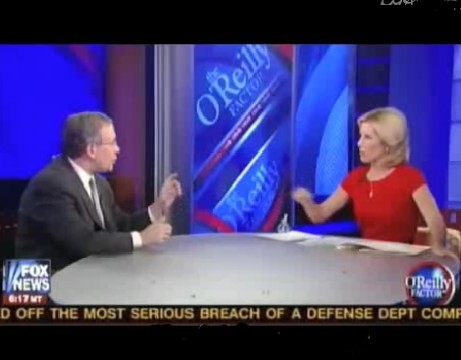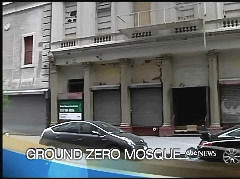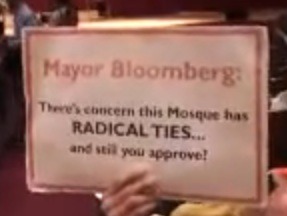As the summer of 2010 comes to a close, American tempers are dramatically rising over the Ground Zero mosque. A fine example of the heat this issue is generating occurred on Wednesday’s “O’Reilly Factor” on Fox News. In the left corner was Manhattan Borough President Scott Stringer. On the right filling in for the usual host was Laura Ingraham. What ensued was an ideological battle that likely pleased folks on both sides of this contentious debate (video follows with transcript and commentary, h/t our friends at the Right Scoop ): LAURA INGRAHAM, HOST: Scott, let’s talk about this controversy in New York that’s made some people say a slow news month of August, quite chaotic. Mayor Bloomberg has now staked his ground. He’s doubled down. He made that comment about it’s un-American. Just to throw the word un-American out seems to be a little odd. I don’t know anyone who’s conflating law abiding Muslims in the United states with al Qaeda. It’s about the sensitivity of the place at Ground Zero. SCOTT STRINGER, MANHATTAN BOROUGH PRESIDENT: There’s no doubt about it. As someone who was in Manhattan on that terrible day when the terrorists attacked, we will never forget that. And we will always honor the families and the people in that community, who didn’t walk away from New York. They actually stayed and rebuilt the community. Having said that, a few very well orchestrated agitators have created a situation where we have now seen Tea Party people going after Jewish American elected officials, Mayor Bloomberg, myself, the speaker of our state assembly Shelly Silver. They’re using this as a national political wedge issue. And I have to tell you something, today we now have a report that a cab driver was stabbed when he told a passenger that he was Muslim. INGRAHAM: Right, well, we don’t know the details. STRINGER: But– INGRAHAM: I mean, throwing out examples like that, we don’t know the details of that, Scott. STRINGER: –I have to tell you something. It’s building– INGRAHAM: Well, let me tell you– STRINGER: –and we should tone this down. INGRAHAM: You want to do an anecdote like that? STRINGER: Let’s tone it down. INGRAHAM: I’m going to throw down to doing anecdote. No, I’m going to keep the temperature up because I think this is important. STRINGER: Well, you’re keeping the temperature up because you’re just– INGRAHAM: No, no, no– STRINGER: –you’re creating something that doesn’t exist. INGRAHAM: I’m not creating anything. STRINGER: Well, of course you are. INGRAHAM: You know what happened down at Ground Zero? STRINGER: And the reason I’m on the show is because we have to fight back to let America know that we’re not like this. INGRAHAM: Do you know what happened at Ground Zero? America disagrees with you vehemently. STRINGER: America does not disagree. INGRAHAM: 77 percent of the country disagrees with you. STRINGER: They do not disagree– INGRAHAM: They’re not Islamophobic. STRINGER: –that we should use anti-Semitic slurs– INGRAHAM: They’re not nasty people. They’re good people. STRINGER: –that we should go after Muslim– INGRAHAM: Do you want to know what anti-Semitic was? Let me get in here. STRINGER: This is your Tea Party friends– INGRAHAM: –what happened at Ground Zero. STRINGER: –trying to create an election (INAUDIBLE) when we all know it. INGRAHAM: And I mean, you dismissed the Tea Parties, but they’re obviously having huge and positive influence in the United States. What happened at Ground Zero– STRINGER: You don’t believe that. INGRAHAM: –in these dueling protests, and I think the more protests the better on both sides. STRINGER: Well, constructive debate is good. INGRAHAM: I think people should have their — well, it’s not up to you to determine what’s constructive. That’s the elite’s little trick. STRINGER: No, but I have– INGRAHAM: That’s the elites trick here. STRINGER: –an opinion, too. You can call me– INGRAHAM: You have an opinion, but let me just tell you what else happened, because you raised the issue– STRINGER: Sure. INGRAHAM: –of Judaism in this debate. There was also an exchange. And Andrew Breitbart has this posted on his website. You should see it because a pro-mosque protester got in the face of an 83-year-old man, who said he was a Holocaust survivor. He got in his face and he said you don’t know what you’re talking about. You don’t know what the con — I mean, he’s in the face of this old man, who survived the Holocaust who doesn’t want this mosque there. STRINGER: That is terrible. But I have to tell you something. I’m talking about– INGRAHAM: How’s that for an example? STRINGER: –Sarah Palin and Newt Gingrich, people trying to divide this country and divide this city of New York. INGRAHAM: Trying to divide this country? STRINGER: It’s not going to work because– INGRAHAM: Do you agree with this imam that America has more blood on its hands than al Qaeda? Do you agree with the imam? STRINGER: I believe that we should have an opportunity for everybody to come together. INGRAHAM: How about an opportunity to hear from him? STRINGER: We don’t go and take away people’s property. We don’t raid people. INGRAHAM: I’m not saying we have a right to do any of that, no, no, no. STRINGER: Of course you are. You’re doing that every day. INGRAHAM: No, no, no, no, no. STRINGER: You’re doing that every day. INGRAHAM: They have a right to build this mosque. We have a right– STRINGER: You– INGRAHAM: –to raise questions about funding. And you as an elected official– STRINGER: You started this. INGRAHAM: You as an elected official should have an obligation to ask this imam– STRINGER: You told Daisy Khan, you told them on this show in December of 2009, you said you’re doing the right thing. INGRAHAM: Assimilating, absolutely. STRINGER: You’re doing great work. INGRAHAM: Assimilating. STRINGER: Rabbis support it. You actually– INGRAHAM: Blood — do you believe America has blood on her hands? STRINGER: You supported this and then you– INGRAHAM: You won’t answer the question, will you? STRINGER: that you left the studio. Well, let me just make point and– INGRAHAM: No, no, you want — blood on her hands? STRINGER: You (INAUDIBLE). What did I do? INGRAHAM: Why don’t you want these questions? STRINGER: What did I do? I didn’t stick to the talking points. I have to now go back and reverse myself because I need ratings. INGRAHAM: No, no, no. That’s what I heard. I heard what you don’t want to hear. STRINGER: You agreed with them. INGRAHAM: Pipe down. You know what I heard? STRINGER: Yes. INGRAHAM: I heard– STRINGER: I saw you on the show. INGRAHAM: –blood on our hands. I heard Americans are mean and they’re Islamophobic and they hate Muslims if they disagree. Is that building bridges? STRINGER: But why did you support the cultural center in December 2009? INGRAHAM: I absolutely support assimilation. STRINGER: Okay. So that’s great. INGRAHAM: I don’t support founders of an organization– STRINGER: So that’s great. INGRAHAM: –who actually believe that America is the equivalent of al Qaeda when destroying Muslim lives.. STRINGER: Then you know what? Let’s go to the FBI and Homeland Security. If you have information I don’t know, we should hear. But in the meantime– INGRAHAM: Read the 2005– STRINGER: –December 2009– INGRAHAM: You apparently don’t care what he says. You just don’t care. STRINGER: You supported this before Michael Bloomberg, before anybody else. INGRAHAM: I supported assimilation. You better believe it. STRINGER: You said what they were doing was the right thing. INGRAHAM: And professor, you got short shrift here. Do what you need to do and ask the questions. Ask questions. STRINGER: I’m just endorsing what you said what should happen. INGRAHAM: That’s so weak. Do you actually get elected with that kind of line? Ask questions. Yikes. Someone throw some water on the contestants. That said, Stringer like so many on his side of this debate greatly misrepresented Ingraham’s interview with Daisy Khan last December. It’s been characterized by most liberal media members that Ingraham on that occasion agreed with the location of this mosque. Here’s the video of that segment along with a full transcript. You decide if that’s what actually happened: INGRAHAM: In the “Impact” segment tonight, some controversy surrounding Islamic mosque and cultural center in the works at Ground Zero. The imam responsible for this project, Feisal Abdul Rauf, has conducted some post-9/11 sensitivity training for the FBI, but he’s also made some questionable remarks about America’s behavior towards Muslims. Joining us now from New York, the imam’s wife, Daisy Khan, the executive director of the American Society for Muslim Advancement. And Daisy, before we get into this, I know you were listening to our previous segment about the culture war with the — the war against Christmas and these ads, and you wanted to comment. DAISY KHAN, EXECUTIVE DIRECTOR, AMERICAN SOCIETY FOR MUSLIM ADVANCEMENTS: Yes. I was most intrigued, because I don’t think that there is a war between people who are believers. I think our real issue is bringing people who disbelieve and, you know, have absolutely no notion of what God is and believe in the existence of God. And this is what our faith community should be doing together to work on a common platform to remove this kind of ignorance against God. INGRAHAM: All right. I like the — I like the backup you’re giving me on that. Let’s talk about the Islamic center at Ground Zero. Questions, I can’t find many people who really have a problem with it. Bloomberg for it. Rabbis in New York saying they don’t have a problem with it. Why near Ground Zero? Why did you choose that space? KHAN: Well, I think the closeness of the center to Ground Zero, first and foremost, is a blow to the extremists. And you know, we Muslims are really fed up, Laura, of having to be defined by the actions of the extremists. You know, we are law-abiding citizens. We are faithful people. We are very good Americans. And we need to project a different message of Islam, one of tolerance, love and the kind of commonalities we have with different faith communities. And the center will be dedicated to promoting what it needs to be Muslim and what it also means to be Americans, and that is the real message that needs to get out. INGRAHAM: When you see surveys, and I know your group takes a moderate approach to Americanizing people, assimilating people, which I applaud. I think that’s fantastic. But when you see — when you see Pew’s survey, the global survey that came out — what is that, 18 months ago or so — global opinions of Muslims, especially younger male Muslims on a number of issues, including whether jihad is morally justifiable, the figures are disturbing to me. And I was wondering what your thoughts were. KHAN: Well, once again, our faith has been defined by people who have political agendas. And what they do is they use religion as a veneer to mobilize people. And what we have to do is talk about what is the central core of all faiths, which is the love of God. And this is a message, and this is why we want to create a center so close to Ground Zero: to promote a different message, one that most majority of Muslims live. I mean, the extremists are a fraction of a fraction of a fraction. And they don’t represent the majority view. And what we are afraid of is that they become the center and the majority. And we have to stop that. INGRAHAM: The problem is — we’re going to get to your husband’s comment from back in 2004 in a minute. But Pope Benedict has asked for parity, kind of a reciprocity. Look, we’ll have a mosque in Rome. Absolutely, a mosque in Rome, freedom of religion. But let’s have a cathedral or a Catholic church in Saudi Arabia. How far do you think he got with that? I mean, or Lebanon today. Try to build a new church in Lebanon. You know, previously a hot bed of Christianity. And you don’t get anywhere. So that’s what kind of upsets Christians, especially with what’s happening to Christians in Iraq and Iran and places like that. KHAN: Well, I completely agree with you. Because if you look at the history of Muslims and you look at, you know, the pluralism that existed within Islamic history over the last 1,400 years, there used to be great mosques and great cathedrals and churches and synagogues in every place. What has happened is there is a new interpretation that has crept in: one of intolerance and one of non-acceptance. And this, we have to push back against that and bring back what, you know, our religion says: there is no compulsion in religion. Which means you can disbelieve and believe, and believe in other faith communities, because… INGRAHAM: Daisy… KHAN: Yes. INGRAHAM: … let’s get into what your husband said in 2004, because this is a sticking point with a lot of people. Sydney Morning Herald interview, he was quoted as saying it was Christians in World War II who bombed civilians in Dresden and Hiroshima, neither of which were military targets. He placed some blame on Christians for starting mass attacks on civilians. That disturbs a lot of people. A lot of American soldiers died liberating Muslims around the world in Kuwait and Bosnia, and they didn’t appreciate that. KHAN: Well, I don’t think he meant it that way. I think what was trying to say is that, you know, when we take — when we have a small crime, and then there is such a huge response to that, where there’s a calamity on such a large scale, that, you know, we have to look at what the law says. And Christians — Christianity is defined by love. When things are done in the name of Christianity like, you know… INGRAHAM: Well, we didn’t — we didn’t wage World War II in the name of Christianity. KHAN: No, I’m not… INGRAHAM: That’s a difference. I mean, our fighter pilots weren’t screaming, “Allah Akbar,” you know, or the equivalent in English, “Praise be to God.” KHAN: Yes. INGRAHAM: I think — I’d amend that if I were he. I’d kind of go back and re-do that statement. But I like what you’re trying to do, and Ms. Khan, we appreciate it. And come on my radio show sometime. KHAN: Yes. We need the support of people like you, seriously. So we… INGRAHAM: OK, take care. All right, Daisy. Take care.

Continue reading here:
Wednesday Night Fights: Laura Ingraham vs. Ground Zero Mosque Supporter




























